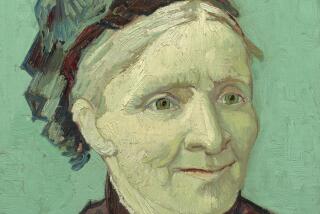BOOK REVIEW : A Master Puzzles Over a World in Pieces : THE TEACHINGS OF DON B.; The satires, parodies, fables, illustrated stories, and plays of Donald Barthelme; <i> Edited by Kim Herzinger</i> ; Introduction by Thomas Pynchon; Turtle Bay Books; $25: 293 pages
The flood of contemporary information, trivial and choked, has risen in Donald Barthelme’s world and is sweeping away almost every landmark of discrimination and value.
We get an aerial view. Individual sensibilities bob here and there in the swollen river. On a housetop, a man in a dinner jacket and a woman wrapped in a futon wave from beside two chairs and a clock. A cow protrudes, hoofs bunched together upon a submerged tree stump.
Barthelme, who died in 1989, was a distinctive master of fragments. They are variously or simultaneously funny, disturbing, fierce and dreamlike. But their true distinction is the voice of the unseen presence that sits trying to put them together. It will fail, but the failure is the point. See what a world we have been given, the voice says: in pieces, some of them missing, others from the wrong set, and no instructions.
It is not exactly an angry voice, though there is anger in it. As Thomas Pynchon writes in a foreword to this collection of what might be called fragments of Barthelme fragments:
“Wise satirical practice requires the sensitivity and skill of a fugu chef at controlling toxicity, that is, knowing how long to suffer, and how gladly, and when to give into rage, and the pleasure of assaulting at last the fools in question.”
“The Teachings of Don B.” is the first of three volumes to be brought out by Turtle Bay Books, assembling mostly uncollected portions of Barthelme’s writings. This one contains short pieces under the heading of “Satires, Parodies, Fables,” several illustrated stories and three unpublished plays. Aside from the plays, most of the pieces first appeared in the New Yorker, usually as unsigned Notes and Comment.
They vary considerably, not so much in their quality, perhaps, as in their endurance. A takeoff on Bret Easton Ellis, another on Batman as a yuppie and Robin as a preppy, a third parodying the Cosmopolitan Girl ads, are among the half or so that survive very frailly indeed. The three plays, although they contain some good material, are a form that Barthelme did not succeed in adapting to his voice or sense of structure.
But in a number of the short pieces, even the evanescent ones, there is a line or an image that shoots us down as we dreamily glide over them.
Barthelme was a master of concealed anti-aircraft fire. A satire on Playboy Bunnies, a familiar-enough genre when the Bunnies were still around, is transformed by the plaint of one who has been fired for losing her “Bunny Image.” She goes to pieces; she does not know to whom her hand belongs, or her shoulder; she has lost her “I.”
Here are the rage and the wildness, and it is these that live the best in the collection. In “The Palace,” the narrator, brainwashed by expensive consumerism, glimpses the pay stub of a Puerto Rican cleaning woman: $84.06, after deductions. What will that buy, he or perhaps she wonders. A session in analysis at $50 (this is 1973), and the rest for cakes and rent? Rhodesian Ridgebacks cost $350 each, so those are probably out. A good tennis racquet would do it.
And the piece, whose comedy, anger and anguish hold in explosive balance, ends with a vision of the city’s desperately underpaid trooping to play tennis with their Abercrombie racquets.
Anger, wit, extravagant associations and disassociations; these would be less memorable if it were not for Barthelme’s ability to evoke dreams and the tenderness with which he does it. Kim Herzinger, editor of the collection, speaks of “bereaved amusement.” Many of these dreams suggest Magritte. But it is Magritte drifting into the simplicity of Rousseau, if one can imagine such a thing.
Take the dream sequence in “Cornell,” which manages to suggest the allure of modern art and the anxiety of the cluttered and empty world it has left to its children.
The surreal sequence goes as follows: A name is put in an envelope, the envelope is put in a museum, the museum is put in another envelope, this one goes into a vault designed by the Romantic painter Caspar David Friedrich, the vault goes in the history of modern art, it falls out and is entrusted to the French kings Charles the Good, Charles the Bold and Charles the Fair.
“They stand juggling cork balls before the many-times encased envelope, whispering names which are not the right one. I put the three kings into a new blue suit; it walked away from me very confidently.”
How does Barthelme suggest so much disquiet in a few lines, lines that hint at how the weight of canonized culture can afflict our overload along with the soap ads?
Pynchon, who knows a thing or two about magical writing, doesn’t answer the question, but at least he authorizes it. Of Barthelme’s power to get his dreams to keep us awake, he writes that he is one of the few writers “who know instinctively how to stash the merchandise, bamboozle the inspectors and smuggle their nocturnal contraband right on past the checkpoints of daylight ‘reality.’ ”
More to Read
The biggest entertainment stories
Get our big stories about Hollywood, film, television, music, arts, culture and more right in your inbox as soon as they publish.
You may occasionally receive promotional content from the Los Angeles Times.










